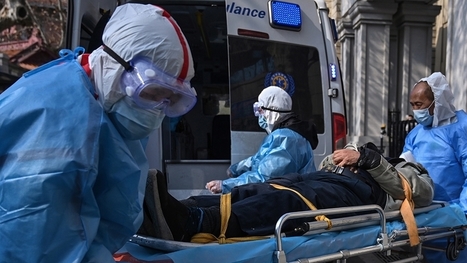 Your new post is loading...

|
Scooped by
Juan Lama
|
People infected with a variant first identified in South Africa are more likely to die than those infected with other variants. People infected with the Beta coronavirus variant are more likely to need critical care and to die than are people infected with other variants1. The Beta variant, also known as B.1.351, was first identified in late 2020 in South Africa, where it sparked a second COVID-19 wave before spreading globally. Some evidence has suggested that severe cases of COVID-19 were more common during South Africa’s Beta-driven second wave than during its first wave, caused by the ancestral version of SARS-CoV-2. To determine whether the Beta variant is linked to increased severity, Laith Jamal Abu-Raddad, an infectious-disease epidemiologist at Weill Cornell Medicine—Qatar in Doha, studied infected people in Qatar in early 2021. During that period two variants were circulating: Beta and Alpha, which originated in the United Kingdom in 2020 and is also known as B.1.1.7. The team did not compare Beta with the Delta variant, which is now ripping through much of the world and which has also been linked to heightened severity. People infected with Beta were 25% more likely than those infected with Alpha to develop severe disease , and around 50% more likely to require critical care, as well as 57% more likely to die. This fits with observations at the time, says Abu-Raddad. As Beta surged in Qatar, acute-care admissions doubled, and ICU admissions and deaths quadrupled. “It was very clear we were talking about a more severe variant,” he adds. The findings have not yet been peer reviewed. The study was small, but it is important because its conclusions stem from a careful comparison of the outcomes of infections with different variants in people with similar characteristics, such as age and sex, says Waasila Jassat, a public health medicine specialist at the National Institute for Communicable Diseases in Johannesburg, South Africa. She led a study2 published in July that found that people were around 30% more likely to die after hospitalization during South Africa’s second wave than in its first. Pinning down Beta’s severity will help researchers to anticipate its effects on health-care systems, Jassat adds. As the more-transmissible Delta variant spreads, Beta is now fading in many places where it was once dominant, including South Africa and Qatar. But Abu-Raddad notes that Beta seems to be more resistant to immunity generated by vaccines and previous infections than are other variants, including Delta, and it could begin wreaking havoc again. “We should never underestimate this pathogen.” Research Cited Available as Preprint in medRxiv (August 4, 2021): https://doi.org/10.1101/2021.08.02.21261465

|
Scooped by
Juan Lama
|
Lockdowns have saved more than three million lives from coronavirus in Europe, a study estimates.The team at Imperial College London said the "death toll would have been huge" without lockdown. Another study argued global lockdowns had "saved more lives, in a shorter period of time, than ever before". The Imperial study assessed the impact of restrictions in 11 European countries - Austria, Belgium, Denmark, France, Germany, Italy, Norway, Spain, Sweden, Switzerland and the UK - up to the beginning of May. By that time, around 130,000 people had died from coronavirus in those countries. The researchers used disease modelling to predict how many deaths there would have been if lockdown had not happened. And the work comes from the same group that guided the UK's decision to go into lockdown. They estimated 3.2 million people would have died by 4 May if not for measures such as closing businesses and telling people to stay at home. That meant lockdown saved around 3.1 million lives, including 470,000 in the UK, 690,000 in France and 630,000 in Italy, the report in the journal Nature shows. "Lockdown averted millions of deaths, those deaths would have been a tragedy," said Dr Seth Flaxman, from Imperial. Their equations made several assumptions, which will affect the figures. They assume nobody would have changed their behaviour in response to the Covid threat without a lockdown - and that hospitals would not be overwhelmed resulting in a surge in deaths, which nearly happened in some countries. The study also does not take into account the health consequences of lockdowns that may take years to fully uncover. The model also predicted that the outbreak would be nearly over by now without lockdown, as so many people would have been infected. More than seven in 10 people in the UK would have had Covid, leading to herd immunity and the virus no longer spreading. Instead, the researchers estimate that up to 15 million people across Europe had been infected by the beginning of May. The researchers say at most, 4% of the population in those countries had been infected. Original Study Published in Nature (June 8, 2020): https://doi.org/10.1038/s41586-020-2405-7
|

|
Scooped by
Juan Lama
|
A slew of detailed studies has now quantified the increased risk the virus poses to older people, men, and other groups. For every 1,000 people infected with the coronavirus who are under the age of 50, almost none will die. For people in their fifties and early sixties, about five will die — more men than women. The risk then climbs steeply as the years accrue. For every 1,000 people in their mid-seventies or older who are infected, around 116 will die. These are the stark statistics obtained by some of the first detailed studies into the mortality risk for COVID-19. Trends in coronavirus deaths by age have been clear since early in the pandemic. Research teams looking at the presence of antibodies against SARS-CoV-2 in people in the general population — in Spain, England, Italy and Geneva in Switzerland — have now quantified that risk, says Marm Kilpatrick, an infectious-disease researcher at the University of California, Santa Cruz. “It gives us a much sharper tool when asking what the impact might be on a certain population that has a certain demographic,” says Kilpatrick. The studies reveal that age is by far the strongest predictor of an infected person’s risk of dying — a metric known as the infection fatality ratio (IFR), which is the proportion of people infected with the virus, including those who didn’t get tested or show symptoms, who will die as a result. “COVID-19 is not just hazardous for elderly people, it is extremely dangerous for people in their mid-fifties, sixties and seventies,” says Andrew Levin, an economist at Dartmouth College in Hanover, New Hampshire, who has estimated that getting COVID-19 is more than 50 times more likely to be fatal for a 60-year-old than is driving a car. But “age cannot explain everything”, says Henrik Salje, an infectious-disease epidemiologist at the University of Cambridge, UK. Gender is also a strong risk factor, with men almost twice more likely to die from the coronavirus than women. And differences between countries in the fatality estimates for older age groups suggest that the risk of dying from coronavirus is also linked to underlying health conditions, the capacity of health-care systems, and whether the virus has spread among people living in elderly-care facilities. To estimate the mortality risk by age, researchers used data from antibody-prevalence studies. In June and July, thousands of people across England received a pinprick antibody test in the post. Of the 109,000 randomly selected teenagers and adults who took the test, some 6% harboured antibodies against SARS-CoV-2. This result was used to calculate an overall IFR for England of 0.9% — or 9 deaths in every 1,000 cases. The IFR was close to zero for people between the ages of 15 and 44, increasing to 3.1% for 65–74-year-olds and to 11.6% for anyone older. The results of the study have been posted to the medRxiv preprint server. Another study from Spain that started in April, and tested for antibodies in more than 61,000 residents in randomly selected households, observed a similar trend. The overall IFR for the population was about 0.8%, but it remained close to zero for people under 50, before rising swiftly to 11.6% for men 80 years old and over; it was 4.6% for women in that age group. The results also revealed that men are more likely to die of the infection than are women — the gap increasing with age. “Men face twice the risk of women,” says Beatriz Pérez-Gómez, an epidemiologist at the Carlos III Institute of Health in Madrid, who was involved in the Spanish study. The results have also been posted to the medRxiv server.Differences in the male and female immune-system response could explain the divergent risks, says Jessica Metcalf, a demographer at Princeton University, New Jersey. “The female immune system might have an edge by detecting pathogens just a bit earlier,” she says...

|
Scooped by
Juan Lama
|
City says 1,290 more people died of COVID-19 than previously thought after cases were missed in early days of outbreak. Wuhan, the central Chinese city where the coronavirus first emerged late last year, revised sharply upwards its death toll from the disease, admitting people died at home and cases were missed as hospitals struggled to cope in the early days of the outbreak. The adjustment, detailed in a social media post by the city government on Friday, increased the death toll by 1,290 - about 50 percent - bringing the total to 3,869. The revision brought the number of dead across China to 4,632. The revisions came as a number of world leaders suggested China had not been entirely open about the full domestic impact of a virus that has now killed more than 140,000 people around the world, and confined half of humanity to their homes. China on Friday denied Western suggestions it had covered up the extent of its coronavirus outbreak and rejected US allegations it has an overly cozy relationship with the World Health Organization (WHO). Foreign Ministry spokesman Zhao Lijian acknowledged the virus's rapid spread contributed to undercounting that resulted in China raising its death toll, but added "there has never been any concealment, and we'll never allow any concealment".
|



 Your new post is loading...
Your new post is loading...










